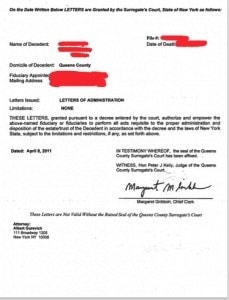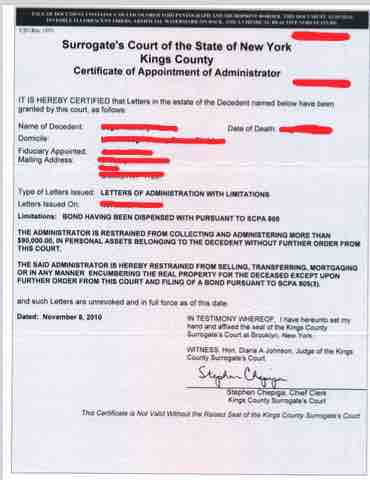What are Letters of Administration in New York City
Letters of Administration are a certificate issued by the court. They certify that a person is authorized to act on behalf of the estate of the decedent. The Letters are an official government document. Individuals and organizations are legally required to honor the Letters of Administration and the Administrator’s authority to act on behalf of the estate.
In New York, you can get Letters of Administration from the Surrogate’s Court. You can have an attorney assist you with the process. And the legal representative of the estate is called Administrator.
Letters of Administration authorize the Administrator to gather the assets of the estate, pay the debts of the estate and disburse the remainder to the distributees of the person how died, as well as to carry out many other actions on behalf of the estate.
What do Letters of Administration Look Like
Here is a redacted image of Letters of Administration obtained by our law firm:
Letters of Administration is Not a Letter
Contrary to what its name suggests, the Letters of Administration is not a letter in the conventional sense. In legal parlance, ‘letters’ is synonymous with ‘Mandate, Authorization, and Order.’ Therefore, a lawyer cannot issue these letters for you. However, a lawyer can represent you throughout the intricate process of securing the Letters of Administration from the court.
If you are looking for an attorney, you can send us an email at [email protected] or call us at 212-233-1233 and we will be able to represent you in getting Letters of Administration in New York.
Who is Eligible to Get Letters of Administration
When someone passes away without a will, the court issues Letters of Administration to appoint an estate administrator. In most circumstances, this role is assigned to a close relative of the deceased such as the surviving spouse, children, grandchildren, or parents. In some cases, the court may appoint a non-relative as an administrator.
If no relatives are available or willing to administer the estate, a government official known as the Public Administrator assumes this responsibility.
The court’s goal is to ensure that the most suitable person, typically the closest living relative, becomes the estate administrator. This decision is part of a procedure called estate administration.
Order of Priority for Letters of Administration
The priority order for granting Letters of Administration, as defined under EPTL § 1001, is as follows:
- The surviving spouse
- The children
- The grandchildren
- The parents
- The siblings
- Other eligible distributees, with preference given to the person entitled to the largest share in the estate.
The existence of a higher priority class excludes the others from petitioning. For instance, a surviving spouse is given priority over children unless the spouse is unqualified. Similarly, children’s presence eliminates the possibility of parents receiving the Letters of Administration. In cases where no individual steps forward to administer the estate, the Public Administrator of the respective county assumes this role.
Eligibility Issues for Letters of Administration
Occasionally, your application for Letters of Administration may be denied, for example:
- if you end up not being related to the decedent
- someone of a higher relationship priority class excludes you
- someone can prove that you’re unqualified.
If that happens, the Letters could be issued to another qualified person, or, if necessary, to the Public Administrator. If you encounter eligibility issues, consult with an attorney.
What You Can Do with Letters of Administration
Once you obtain Letters of Administration in New York, you become the authorized representative of an estate. These letters enable you to handle various estate administration responsibilities. Here are some of the things you can do:
- Obtain a tax id number for an estate from the federal government
- Open an estate bank account
- Request information from banks and other institutions that control the decedent’s assets.
- The banks will comply if you show them the Letters of Administration and the death certificate
- Transfer assets from the decedent’s name to the name of the estate
- Pay debts of the decedent
- Collect claims of the decedent
- Marshal assets of the estate
- Distribute the estate assets to the beneficiaries of the estate, after obtaining proper waivers or providing an accounting
These things would be impossible to do without New York Letters of Administration. The banks will not give you information and will not transfer the money in the accounts; the county recorder will not record property deeds, and a buyer will not buy a property from you.
Fiduciary duty
As estate administrator, you serve as a fiduciary with the duty to act in the best interests of the estate and beneficiaries. Self-dealing or conflicts of interest may lead to removal and liability. The beneficiaries can have the administrator removed, and the administrator can be liable for damages.
Our legal team provides guidance on properly fulfilling your fiduciary duties and administrative responsibilities.
What if You Need More Than One Copy
You often need more than one certified copy, since each bank and government agency would require an original. Also, since some institutions require a more official-looking document, the court can issue a Certificate of Appointment of Administrator. It’s printed on watermarked blue paper and looks similar to a death certificate, birth certificate, or marriage certificate.
Here is a redacted image of a Certificate of Appointment of Administrator obtained by our law firm:
What are the Different Types of Letters of Administration
In certain circumstances, special types of Letters of Administration may be issued.
Ancillary Letters of Administration
When a decedent dies in a different state but left property in New York, the administrator who has been granted letters of administration from another state needs to file a petition for ancillary letters of administration in the county of the New York Surrogate’s Court where the property is located.
The court will grant you Ancillary Letters of Administration by verifying out-of-state Letters of Administration through a New York ancillary administration proceeding.
Limited Letters of Administration
Limited letters of administration may also be issued by the court to perform limited functions, such as initiating a lawsuit, investigating estate assets, or initiating discovery and turnover proceedings of assets of the deceased that are in the hands of a third person. Limited letters can also be issued even when there is already an administrator or executor appointed by the court, especially when the purpose is to investigate an executor’s self-dealing activities that might be considered unfair or fraudulent, or when you want to investigate conversion or theft of assets.
Temporary Letters of Administration
Temporary letters of administration expire every six months and are issued when there is an anticipated delay in the issuance of full letters of administration and there is a need to take action in order to protect the interests of the estate. For example, when it will take time to acquire jurisdiction over all necessary parties, when not everyone signs waivers and consents, when one is trying to probate a copy of a lost will, or when the nominated executor renounces or is incompetent or unqualified to serve, the court may issue temporary letters to protect the estate. It is also issued in cases of an absentee person (a person who has disappeared but has left property in the state).
Other Types of “Letters”
While Letters of Administration is crucial when a person dies without a will, there are other types of ‘letters’ that you may encounter. Letters Testamentary are issued to a nominated executor when a person dies with a will, and Voluntary Letters of Administration are issued to a voluntary administrator when a person dies with a small estate, irrespective of whether they left a will or not.
Knowing what kind of letters to request from the court is important because applying for the wrong kind can delay your access to the estate.
If the person died with a will, the personal representative is called an executor. If the person died without a will, the personal representative is called an administrator. If the person died with a small estate, regardless of whether he had a will or not, the personal representative is called a Voluntary Administrator.
How Our Law Firm Helps Obtain Letters of Administration
To obtain Letters of Administration, our attorneys will:
- File the Petition for Administration along with supporting docs like the death certificate
- Represent you at the appointment hearing before the Surrogate’s Court
- Advise you through every step of the estate administration process
It typically takes a few months to receive the letters after filing. We help expedite the process and resolve any disputes or complications
If you would like legal representation in obtaining Letters of Administration, we at the Law Offices of Albert Goodwin are here for you. We have offices in New York City, Brooklyn, NY and Queens, NY. You can call us at 212-233-1233 or send us an email at [email protected].
Sources:


